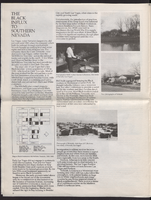Search the Special Collections and Archives Portal
Search Results
Thalia Dondero oral history interviews
Identifier
Abstract
Oral history interviews with Thalia Dondero conducted by Suzanne Becker on March 10, 2008 and August 22, 2008 for the Women's Research Institute of Nevada (WRIN) Las Vegas Women Oral History Project. Dondero opens her interviews discussing why she became involved with the Las Vegas, Nevada Parent Teacher Association (PTA) and eventually the Nevada State PTA. Dondero then describes her work with the Girl Scouts and her election campaign for a seat on the Clark County Commission. Dondero also discusses Las Vegas city development and how the city has flooding issues. Later Dondero discusses her membership in the Las Vegas Junior League and her work throughout the state to supervise the living conditions of foster care children. Lastly, she describes her experience as a commissioner working to ensure various goods and services were available to the community.
Archival Collection
History of Blue Diamond in Nevada Oral History Project Public Event
Identifier
Abstract
History of Blue Diamond in Nevada Oral History Project Public Event conducted by the Blue Diamond History Committee from approximately 2005 to 2015 for the History of Blue Diamond Village in Nevada Oral History Project. During this event, multiple unidentified individuals narrate the history of Blue Diamond Village in a public event hosted by the Blue Diamond History Committee. Other individuals also share personal stories of their experiences in Blue Diamond Village.
Archival Collection
"History of CCSD" oral history interviews, 2005
Level of Description
Archival Collection
Collection Name: Patrick W. Carlton Papers on the Oral History of the Public School Principalship Project
Box/Folder: Box 10
Archival Component
Jose Alvarez oral history interview
Identifier
Abstract
Oral history interview with Jose Alvarez conducted by Kendall Worthington, Chava Haron, Dr. Norma Lisa Flores, and Claytee D. White on November 28, 2018 for the Latinx Voices of Southern Nevada Oral History Project. In this interview, Jose Alvarez talks about his early life in Buenos Aires, Argentina, sharing what it was like growing up there. He shares his family history as well as his immigration to the United States. He first moved to New York City, New York, working as a dishwasher and/or busboy in New York City restaurants and resorts in the Catskills. In 1968, Alvarez moved to Las Vegas, Nevada when he got a job at the Landmark Hotel. He shares his experiences working in the hospitality industry for 22 years. Alvarez also discusses playing and watching soccer.
Archival Collection
Joan Swift oral history interviews
Identifier
Abstract
Oral history interviews with Joan Swift conducted by Sue Peterson on March 18, 2004, March 25, 2004, and June 22, 2004 for the Boyer Early Las Vegas Oral History Project. In this interview, Swift discusses life in Las Vegas, Nevada during the 1940s and 1950s. Swift begins the interview by describing her upbringing in the Basic townsite and Boulder City, Nevada, attending Basic High School, and life in Southern Nevada during World War II. She then discusses working in the Clark County Recorder's office, explaining her job duties and what function the office served for the county. Swift continues, talking about recreation activities at the time, including visiting the casinos on the Las Vegas Strip and the Helldorado Parades. Swift discusses nuclear weapons testing at the Nevada Test Site and her career as the Clark County recorder. Lastly, she describes her thoughts on the future of Las Vegas, Nevada.
Archival Collection
Ivory H. Blue II oral history interview
Identifier
Abstract
Oral history interview with Ivory H. Blue II conducted by John Grygo on 2013 February 22 for the African Americans in Las Vegas: A Collaborative Oral History Project. This oral history documents the early life of Ivory H. Blue II in Las Vegas, Nevada while growing up in the Westside projects. He also discusses his college years in the 1990s at the University of Nevada, Las Vegas.
Archival Collection

"UNLV renews legacy of history teacher Wright": newspaper clipping
Date
Archival Collection
Description
April 22, 2005 Las Vegas Review-Journal tear sheet featuring a story about Wright Hall.
Mixed Content
Ruth Moore Weaver oral history interview
Identifier
Abstract
Oral history interview with Ruth Moore Weaver conducted by her grandson, Danny Weaver, on November 22, 1986 for the Ralph Roske Oral History Project on Early Las Vegas. In this interview, Weaver begins by discussing her early life and family history. Weaver describes how Las Vegas, Nevada has developed and changed, as well her and her husband's participation in community organizations. She talks about her husband's jobs, how she prefers living in Southern Nevada compared to other areas, and segregation in the city. Weaver concludes by discussing why she prefers to live in Henderson, Nevada and the history of gambling in Nevada.
Archival Collection

